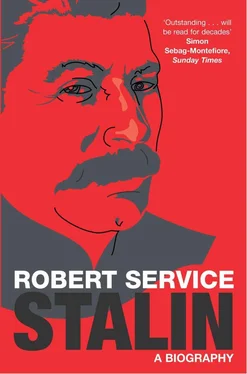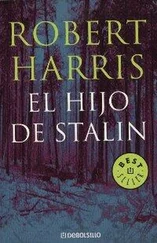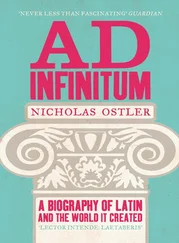Leaving the Seminary, Joseph Dzhughashvili had to find paid employment without delay. Gori held no attraction. Only Tbilisi offered serious opportunities and Joseph anyway wanted to combine work with revolutionary activity. For a while he eked out a living by giving private lessons; 1but on 28 December 1899 his friends helped to get him a job at the Physical Observatory in Mikhailovski Street. He worked there for three months. It was his only period of sustained employment until after the October Revolution. Joseph bought the Russian translation of Sir Norman Lockyer’s Astronomy , first published in 1874, for reference. 2His daily duties required him to record the temperature and weather four times. The only technical necessity was to read the magnetic tape, which he needed to sign each day before consigning it to the Observatory files. 3
He had been sleeping at the Observatory off and on since October when Vano Ketskhoveli — his school friend in Gori — started work there. By the end of the year M. Davitashvili, yet another Gori school friend and former seminarist, had joined them in the same single room. 4The cramped conditions were alleviated by the fact that Davitashvili often stayed with relatives in the city. Then in January 1900 Joseph and Vano were given a two-room flat on the ground floor overlooking the pleasant garden at the back of the building. Soon they had welcomed ex-seminarist V. Berdzenishvili as fellow tenant. 5All were hostile to the Imperial order and wanted revolutionary change. The flat became a meeting place for other dissenters. Mikhailovski Street was the busiest left-bank thoroughfare in Tbilisi so that friends could come and go without attracting suspicion. Among those who made contact was Vano Ketskhoveli’s elder brother Lado (who had been expelled from the Seminary in 1893). 6Joseph and Lado hit it off despite the difference in years. Both were strong-willed and ambitious. They were practical organisers in the making. It was a matter of time before they would want to move beyond their discussions in the Physical Observatory.
Having repudiated the Seminary and its regulatory code, Joseph wanted to look the part of a tough, unsentimental revolutionary. His father had worked in a factory. So, too, had Joseph briefly: he needed no one to teach him the mores of the working class in the Russian Empire. Joseph refused to wear the typical three-piece suit of the Marxist theoretician: 7
[He] wore a plain black Russian shirt with a red cravat typical of all social-democrats. In winter he also put on a long brown overcoat. For headgear he wore only a Russian cap… One did not see him except in a rumpled shirt and unpolished shoes. Altogether he aimed to show that his mind was not a bourgeois one.
His slovenliness signalled a deliberate rejection of ‘middle-class’ values. Yet at the same time there was a complication. The cut of his shirt was Russian but the fact that it was black marked him out as a Georgian. The national ambiguity reflected a will to live on his own terms. He wanted to appear ‘proletarian’ while also being taken for an ‘intellectual’. To workers he was a teacher and an organiser; to educated comrades he was an organiser and a potential pupil.
Groups of Marxists in Tbilisi scrabbled around to obtain the political texts they needed. Works by Marx, Engels, Lassalle and Dickstein as well as Georgi Plekhanov and Alexander Bogdanov were carefully studied in the 1890s. 8Works on earlier generations of Russian revolutionaries, on the Paris Commune of 1871 and on the French Revolution were also examined. 9Among the Marxist groups was one led by Lev Rozenfeld and Suren Spandaryan. Rozenfeld was to become better known under his pseudonym Kamenev. Kamenev and Spandaryan would later become comrades of Dzhughashvili. Kamenev had been a pupil at the First Classical Gimnazia. His father was a leading engineer and entrepreneur who helped to construct the oil pipeline from Baku to Batumi. Confidently he gave talks on Marxist theory. Dzhughashvili attended one of them at the suggestion of his Gori friend Davrishevi and was impressed. 10It was a situation of historical irony: Kamenev, who played a part in attracting him to Marxism, was to be shot by Stalin’s political police (known at that time as the NKVD) in 1936. At any rate these ex-students of the Seminary and the Classical Gimnazia felt there was a world to be explored. Workers were at its analytical core but were not yet a fulcrum of Marxist activity.
Although he was tied to the Observatory premises for long hours each day, Joseph’s tasks were hardly onerous; he could read what he wanted while he was on duty. It was a welcome change from the Seminary. He used his leisure productively. Among the recently published books he acquired was Alexander Bogdanov’s Short Course in Economic Science . Not all the works in his growing library were Marxist. Joseph also bought General Philosophy of the Soul by the mid-nineteenth-century exiled Russian aristocrat Alexander Herzen. Nor did he give up his interest in Georgian, Russian and European literature. But Marxism was at the centre of his plans for his future. He always did things with a definite purpose. In this case the purpose was clear. Joseph planned to revive his writing career with contributions to Marxist discussions in Georgia.
The best among the possibilities for him at the turn of the century was the newspaper Kvali , which had been handed over to a surprised Noe Zhordania in 1898 (and which had published some of Dzhughash-vili’s poems before he abandoned literary ambition). Kvali made an impact on the Georgian intelligentsia with its critical analysis of social and economic conditions. The Caucasian office of the Imperial censorship took a gentle approach to Kvali , and Zhordania directly upbraided the chief censor when he objected to a particular issue of the news-paper. 11Yet it was Joseph Iremashvili, who like Dzhughashvili had declined to complete his priest’s training, who first offered an article to Kvali . Dzhughashvili congratulated his friend on his piece on the agrarian question. 12Meanwhile Iremashvili noted how hard Dzhughashvili was studying. On the table in the Observatory flat lay a pile of works by Plekhanov and Lenin (whose real name was Vladimir Ilich Ulyanov) — already Dzhughashvili was Lenin’s admirer. 13Dzhughashvili was not yet ready with something to say. He had become cautious. Instead he threw himself into propaganda activity among the workers of Tbilisi. This was the norm for Marxist intellectuals. While educating themselves through the works of Marx and Engels, they popularised Marxist ideas among railwaymen, shoemakers and textile-factory labourers. Dzhughashvili was given two workers’ circles to lead. 14
Joseph’s progress was disturbed on the night of 21–22 March 1901. The police raided several homes inhabited by Marxists, and the Observatory was on their list. Joseph had been under surveillance virtually since starting work there. 15Several of his friends across the city were arrested but he was untouched. It was not the last time that he was lucky (which later gave rise to the suspicion that he was an agent of the Imperial political police, the Okhrana). 16But obviously he could not return to the Observatory without the risk of being detained. He opted for an existence on the run. His mind was made up. He lived for revolution and knew that this would bring frequent uncomfortable episodes along with it. Prison and exile were eventually inevitable. For the next few weeks he moved from house to house of political associates.
The Georgian Marxists took their nation’s development seriously. But Georgia posed problems. Most Georgians did not think of themselves first and foremost as Georgians. They saw themselves as belonging to one or other of the large ethnic groups in Georgia and some of them, especially the Mingrelians, spoke their own different language. But Georgian Marxists believed that encouragement of a national consciousness would enhance political development and, ultimately, the dissemination of socialist ideas. Another difficulty was geopolitical. The Marxists could see that Georgia’s independence would put the country at the mercy of the Ottoman Empire. Marxism in any case taught them to see salvation not by means of secession from Russia but through the advancement of the working classes in all countries. All of them wanted Marxism to become a united force regardless of national backgrounds across the entire Caucasus. Georgians, Armenians and Azeris should be encouraged to struggle together against the Romanov monarchy and its political and social order. The Marxists of the Caucasus should also adhere to the Russian Social-Democratic Workers’ Party, founded in 1898, which covered the entire Russian Empire.
Читать дальше












